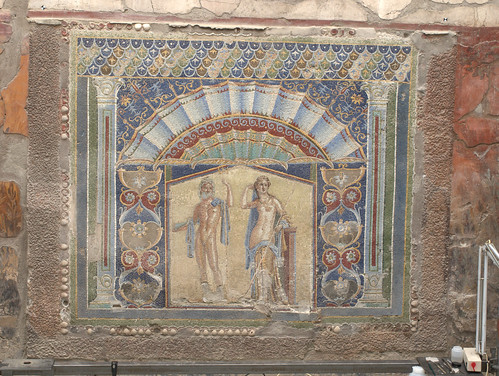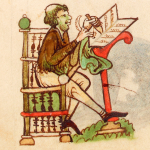|
Amused to Death posted:I think that might depend on where one was. Italy proper suffered pretty bad in the 6th century but that was because of the constant wars between the Goths and the Eastern Roman empire, followed by the Lombards, with a little bit of Justinian's plague thrown in. It does. You would have noticed it in Britain too. In Spain or France or North Africa, not really.
|
|
|
|

|
| # ? Apr 29, 2024 00:07 |
|
Farecoal posted:Also, how much do we know about vulgar Latin? Quite a lot, actually, considering that it was a language that was only spoken, almost never written down, and that ceased to exist as an independent language somewhen during the early Middle Ages. In general, there are several possible kinds of sources from which we can glean something about Vulgar Latin: 1. grammatical errors in written texts, where the authors apparently weren't too sure about the correct usage of the word or phrase and just wrote as they would have spoken, 2. there were some grammarians in ancient Rome (mostly during the later stages of the Western Empire) who wrote prescriptive texts about what they perceived to be the errors of spoken Latin, 3. some literary texts where Vulgar Latin is used as a stylistic device and 4. some inscriptions and graffiti as well as early medieval glosses, when monks had to "translate" words of the Bible they weren't used to anymore. Also, there is the possibility of reconstructing the spoken Latin by looking at the oldest stages of the various Romance languages and trying to go back. So, what do we know? Vulgar Latin had a vocabulary that differed in many places from the Classical Latin lexicon. Words like "equus" (horse) seem to have been used almost exclusively in written contexts, whereas in spoken Latin "caballus" was used, cf. French cheval, Italian cavallo, Spanish caballo, Romanian cal, Catalan cavall... The word "caballus" actually is a loanword the Romans adopted from Celtic; "equus" survives in a rather restricted meaning as the word for "mare" in several Romance languages. This development, where the "main" word for something is delegated into a very specific and restricted meaning is actually a very common occurence in linguistics and can be observed with hundreds of Latin words. Other of those "differing" words are e.g. "campus" (field) instead of "ager" or "infantes" (children) instead of "liberi". Changes in phonology were numerous as well. There is a very nice source for that: the Appendix Probi, a compilation of common "errors" in written Latin from around 300 AD. Vulgar Latin also developed articles, something classical Latin lacked. It's hard to say when this started to develop, but even Cicero used "unus" as an indefinite article sometimes instead of the Classical "quidam" (a certain/some). Vulgar Latin seems to have merged the masculine and the neuter rather early as well, probably because ending consonants seem to have grown more and more silent in spoken Latin - an epitaph from 150 BC (!) reads "TAVRASIA CISAVNA SAMNIO CEPIT" instead of the Classical "TAVRASIAM CISAVUNAM SAMNIVM CEPIT". This loss of distinction made the differences between the two cases increasingly vague, eventually leading to a complete merge. This was far from a unified development, though. We don't know too much about it, but Vulgar Latin had developed numerous dialects that seem to have differed greatly in some areas, and some Romance languages branched off way earlier than the others did, for example Sardinian (which therefore is considered to be the most conservative of all Romance languages, preserving many features from the original Latin that were lost or transformed in the other Romance languages). The language closest to Vulgar Latin (in phonology and grammar, but not in vocabulary, as Sardinian developed under extensive contact with Italian, Catalan, Spanish amd Corsican along with a strong substratum of an otherwise unknown Pre-Latin language) would be the Logudorese dialect of Northern Sardinia. Quite a lot of the details I wrote are still up to debate to a certain extent, however, so please take everything I wrote with a grain of salt - trying to reconstruct a language spoken 1,500 years ago with almost no written records is a tricky business 
|
|
|
|
Given that I actually am a Roman, not only I will tell you I am learning a lot from all these 17 pages of joy (for which I truly, truly thank you) but also that (fun fact) something Roman is still very much evident amongst modern Romans: arrogance. Nobody that is born in Rome would ever say they wish they were born elsewhere, we always make a point of going heavy on our accent so that people know full well where we're from and still, I guarantee you, still on this day we go into other towns and "feel Roman". However, here's my question: what can you tell us of the Catacombs? (they are such big part of Roman history and yet have not seen them mentioned yet) Over to you for another 17 pages that I will absolutely read line by line. Grazie.
|
|
|
|
Why did Britian (and the Germanic tribes which invaded it) not Romanize, when the rest of the WRE did?
|
|
|
|
|
nothing to seehere posted:Why did Britian (and the Germanic tribes which invaded it) not Romanize, when the rest of the WRE did? The Anglo-Saxons ultimately became Romanised in the sense that they adopted Christianity and its (Rome-based) institutions, Latin as a language of learning and culture and so on, but they didn't go for it wholesale e.g. English is still a Germanic language, Roman law never influenced the legal system much and the Anglo-Saxon system of government used the old Germanic institutions. I think the timing is key in that the other Germanic peoples who came into the Empire had a long history of contact with the Romans or turned up at a time when the Empire was still a going concern and the Romans were still the elite, and worth imitating. The Anglo-Saxons didn't have that contact and didn't have the experience of moving into a country that still had a functioning Roman administration or aristocracy.
|
|
|
|
I've been watching Spartacus (the TV series) lately and I would like to learn more about the Roman Empire. Is there a recommended documentary that would take me from the beginning to the very end?
|
|
|
|
English is still incredibly influenced by Latin. The legal system as well. Though that is mostly due to the Normans.
|
|
|
|
Boris Galerkin posted:I've been watching Spartacus (the TV series) lately and I would like to learn more about the Roman Empire. Is there a recommended documentary that would take me from the beginning to the very end? If you listen to podcasts, I cannot recommend The History of Rome enough, it will cover that entire lifespan, and there are something like 180 episodes, each around 20 min long.
|
|
|
|
WoodrowSkillson posted:If you listen to podcasts, I cannot recommend The History of Rome enough, it will cover that entire lifespan, and there are something like 180 episodes, each around 20 min long. I just got from Aeneas through the First Samnite War. The guy will tell you not just the recorded history, but also what part of the history contains similar features to stories in other cultures so could have happened, but probably didn't. It's hard to keep all the names straight because they are people I've never heard of before, and I got lost in the later kings of Rome. Still, this podcast is very well done. I found the part about Veii and whether to rebuild Rome at all or move to Veii after the Gauls sacked Rome to be particularly interesting and well-done, especially in light of recurring comments in this thread that what made the Romans successful is that, whenever it looked like Rome was done for, they outlawed whining and formed more legions.
|
|
|
|
What can you tell me about Abortion? I know that the Visigothic code was super against it and made a point of outlawing it. Was that just because of Christianity, or just because of Arianism, or did other people hate it?
|
|
|
|
General Panic posted:The Anglo-Saxons ultimately became Romanised in the sense that they adopted Christianity and its (Rome-based) institutions, Latin as a language of learning and culture and so on, but they didn't go for it wholesale e.g. English is still a Germanic language, Roman law never influenced the legal system much and the Anglo-Saxon system of government used the old Germanic institutions. I think you're stretching the meaning of Romanization here considering the Anglo-Saxons actually exterminated the Christian faith in England; England wouldn't become Christian again until the 7th-8th centuries when Irish and French missionaries began converting Britain. I'm not so sure about the use of latin as a language of learning, but without the Christian church I doubt it was anywhere near as common as in other former Roman provinces. most of our sources from that period like Beowulf appear in Anglo-Saxon, and Germanic runes are commonly used in inscriptions. In my opinion, up until the Norman conquest England really more closely resembled the Nordic countries than it did the more Roman polities to its south. To answer why England was so German is pretty hard! There are a lot of theories that suggest a really brutal transition involving the virtual extermination of the Roman-British peoples by the Anglo-Saxons, however many of those theories have been heavily influenced by weird and creepy race science meant to contrast a supposedly Germanic England with Celtic Wales, Ireland, and Scotland. A lot of the genetic evidence supporting an Anglo-Saxon displacement of the former English population has been discredited. Mostly likely it seems the Anglo-Saxon elite were just more successful at monopolizing power in their newly conquered territory and so could more easily push their language and culture on the formerly Roman lower class.
|
|
|
|
nothing to seehere posted:Why did Britian (and the Germanic tribes which invaded it) not Romanize, when the rest of the WRE did? Roman culture didn't seem to stick in Britain. Part of it is that Britain was abandoned--most of the Romans (and those Romano-British who didn't want to stay) ended up leaving the island, so there wasn't as much Roman stuff left. The entire island seems to have been de-urbanizing and the economy was going down. There's a lot of debate about what actually happened, though. We know a lot of people moved from Britain to Brittany, hence, you know, the name. In any event, by the time the Angles and Saxons showed up, it wasn't like in the other areas where the Germanic tribes were taking over areas that were every bit as Roman as Rome itself. And it's possible that those Germans weren't interested in Romanizing the way people like the Visigoths were. WoodrowSkillson posted:If you listen to podcasts, I cannot recommend The History of Rome enough, it will cover that entire lifespan, and there are something like 180 episodes, each around 20 min long. Yeah, if you want a full overview (to 476) this is a good option. I don't know of a documentary series covering the whole span. I've watched some good ones but they all tend to have the same names so it's hard to keep it straight. It's like remembering which bullshit Chinese restaurant you went to, you know it's some combination of Dragon China Panda and Lotus.
|
|
|
|
Visigoths, Anglos, Saxons. This might not be the best thread for it so please don't go through too much trouble to answer me if it's not relevant to the topic, but how can I learn (efficiently) more about these tribes and where they come from?
|
|
|
|
an skeleton posted:Visigoths, Anglos, Saxons. This might not be the best thread for it so please don't go through too much trouble to answer me if it's not relevant to the topic, but how can I learn (efficiently) more about these tribes and where they come from? I don't know. There are books out there but I haven't read any. A lot of that history is, unfortunately, speculative since these tribes didn't have writing systems, so what comes down to us is almost always Roman records. And the Romans were, uh, less than truthful about them. That's why we get this picture of Gauls as barbarians instead of the complex, advanced civilization they actually were, for one notable example.
|
|
|
|
WoodrowSkillson posted:If you listen to podcasts, I cannot recommend The History of Rome enough, it will cover that entire lifespan, and there are something like 180 episodes, each around 20 min long. Yeah thanks but I don't do podcasts. The only way for me to actually get something out of one is to do absolutely nothing else when listening because I can't pay attention and do something else (eg working, gaming), just one or the other, and I have absolutely no interest in staring at iTunes for X minutes no matter the topic.
|
|
|
|
Boris Galerkin posted:Yeah thanks but I don't do podcasts. The only way for me to actually get something out of one is to do absolutely nothing else when listening because I can't pay attention and do something else (eg working, gaming), just one or the other, and I have absolutely no interest in staring at iTunes for X minutes no matter the topic.
|
|
|
|
Grand Fromage posted:Roman culture didn't seem to stick in Britain. Part of it is that Britain was abandoned--most of the Romans (and those Romano-British who didn't want to stay) ended up leaving the island, so there wasn't as much Roman stuff left. The entire island seems to have been de-urbanizing and the economy was going down. There's a lot of debate about what actually happened, though. We know a lot of people moved from Britain to Brittany, hence, you know, the name. I've read a few books that say Britain itself was fairly Romanized up until about the 6th century. The later western Emperors had contact with British Roman cavalry up until the fall of the Emperor in the West.
|
|
|
|
sbaldrick posted:I've read a few books that say Britain itself was fairly Romanized up until about the 6th century. The later western Emperors had contact with British Roman cavalry up until the fall of the Emperor in the West. Yeah, I'm fairly certain the last Roman Britons did not leave until the emperors fell and the coast of the mainland was no longer friendly
|
|
|
|
sbaldrick posted:I've read a few books that say Britain itself was fairly Romanized up until about the 6th century. The later western Emperors had contact with British Roman cavalry up until the fall of the Emperor in the West. They didn't all leave by any means, just a significant number did. And the legions were all pulled out in... 402 I believe. Somewhere around there. The timeline is unclear since we don't have good records, but all the Roman cities show evidence of deurbanization. Fewer buildings constructed, soils that show that farming was occurring within the city, and the general goods we find show a worsening economy. There are still Romans/Romano-Britons there, but by the time the Angles and Saxons are taking over, it is not a Roman territory the way that, say, Spain is.
|
|
|
|
Hoxne Hoard was buried sometime after the Legions left http://en.wikipedia.org/wiki/Hoxne_Hoard Maybe that stuff was buried because of a general breakdown in order? Who knows. Hoxne had this gorgeous body chain: 
|
|
|
|
euphronius posted:Maybe that stuff was buried because of a general breakdown in order? Who knows. That's a popular hypothesis, yeah. Hoards are a common way of storing wealth in the ancient world, but you see an increase in them when poo poo is rougher. The money under the mattress instinct is built in. The biggest ancient coin hoard ever found was in Afghanistan, incidentally. So many Greek coins that they didn't even count them--the find was simply sold off by weight. It was a huge loss for archaeology, especially considering how hard it is to find anything about Greco-Bactria.
|
|
|
|
euphronius posted:English is still incredibly influenced by Latin. The legal system as well. Though that is mostly due to the Normans. And not just the Normans. People have been creating or importing Latin-based words into English ever since 1066, expecially in areas like science and technology. However, the central vocabulary of basic English words is still mostly Germanic in origin. The legal system in English-speaking countries still uses Latin terminology a lot (although there has actually been an effort to reduce that in recent years in England itself, for greater accessibility). However, the point I was making is that it isn't, by and large, derived from Roman legal concepts. Continental European legal systems and those based on them often are.
|
|
|
|
euphronius posted:Hoxne Hoard was buried sometime after the Legions left http://en.wikipedia.org/wiki/Hoxne_Hoard I imagine that would make a fine outfit for Dejah Thoris.
|
|
|
|
Did ancient Rome ever have any dealings with the eastern Oriat Hoards? I understand that there were a bunch of Khanates ruling in the East for a big chunk of history but I'm not sure how far back some of them go so I was curious. Also how was Rome's relation with Egypt? Did they mostly get along and only went at odds on occasion or were they constantly at each others throats?
|
|
|
|
I've been playing around with the Oregon Trail version of the ORBIS network: http://orbis.stanford.edu/via/ And I thought somebody could use it to make a cool travelogue of some of the more important trips in Roman history like St. Paul or some campaigns or something. I don't think it would work so well for Caeser's conquests or a full LP, but if somebody wanted to show where people went, it's fun.
|
|
|
|
Girafro posted:Also how was Rome's relation with Egypt? Did they mostly get along and only went at odds on occasion or were they constantly at each others throats? They mostly got along, namely because Egypt was a Roman province from the time of Augustus. I think it was a fairly stable province but I'm not too sure of its history before the annexation apart from it being a sort of protectorate of Rome.
|
|
|
|
Octy posted:They mostly got along, namely because Egypt was a Roman province from the time of Augustus. I think it was a fairly stable province but I'm not too sure of its history before the annexation apart from it being a sort of protectorate of Rome. There were a couple of revolts early on but for the most part things were fine. The Mongols show up very late in Roman history, after the Fourth Crusade. I don't specifically know anything about it but given the general state of Rome at the time, I'd guess desperately trying to avoid being overrun.
|
|
|
|
What was around the western edge of Africa during the Roman times? Did they have contact / trade with them?
|
|
|
|
euphronius posted:Hoxne Hoard was buried sometime after the Legions left http://en.wikipedia.org/wiki/Hoxne_Hoard My favourite bit: quote:Peter Whatling, the tenant farmer, had lost a hammer and asked his friend Eric Lawes, a retired gardener and amateur metal detectorist, to help look for it.
|
|
|
|
Girafro posted:Also how was Rome's relation with Egypt? Did they mostly get along and only went at odds on occasion or were they constantly at each others throats? I really havent ever found any Roman commenting on Egypt before the Ptolemayic(?) dynasty, which was thoroughly 100% hellenized. I do know that late-republican Senators absolutely loved to humiliate the kings of Egypt, with one story of Cato the Younger having him administer a laxative for the sole purpose of being able to summon the King of Egypt to himself while he was on the shitter. Cleopatra none-withstanding, most of the time the Romans were satisfied with the immense amount of grain the Egyptian kings "gifted" them for the privilege of not being annexed.
|
|
|
|
Grand Fromage posted:The Mongols show up very late in Roman history, after the Fourth Crusade. I don't specifically know anything about it but given the general state of Rome at the time, I'd guess desperately trying to avoid being overrun. Oh man, this is why most historians tend to eschew the term 'Roman' at some point after the seventh century. Makes for confusing reading! But some cool dealings with the Mongols do occur in the thirteenth century, as a number of Byzantine princesses* are married off to Mongol generals. It helps to keep them off the empire's back in Anatolia (though by the late thirteenth century internal disruptions with the horde were doing that just fine). Off hand I can also recall at least one mention of several thousand Mongol troops being sent off by a happily married general to support an imperial army in an assault. *So many in fact, that it's been argued that a number of them may just have been commoners given a brief courtly education and then sent off to marry men who wouldn't know the difference.
|
|
|
|
Veeta posted:Oh man, this is why most historians tend to eschew the term 'Roman' at some point after the seventh century. Makes for confusing reading! But some cool dealings with the Mongols do occur in the thirteenth century, as a number of Byzantine princesses* are married off to Mongol generals. It helps to keep them off the empire's back in Anatolia (though by the late thirteenth century internal disruptions with the horde were doing that just fine). Off hand I can also recall at least one mention of several thousand Mongol troops being sent off by a happily married general to support an imperial army in an assault. Never heard about this one, interesting stuff. My impression was that contact with western Europe was mainly envoys being sent to the Pope and telling them to submit to the Golden Horde or be destroyed but then the Pope basically tossed it into a bill pile and that got put on the backburner, but this isn't the Mongol thread so...
|
|
|
|
I don't know much about the subject, but efforts are made to get in contact with the Mongols, and the idea of converting them is mooted by some. To keep my post vaguely on topic, William of Rubruck mentions bumping into Byzantine emissaries somewhere in central Asia, I think.
|
|
|
|
What happened to the Pope when / Roman Catholic Church when the Goths? conquered Rome? Or had the schism not happened yet?
|
|
|
|
What's the deal with all of these plagues? What were they like and how many people did they kill?
|
|
|
|
Veeta posted:I don't know much about the subject, but efforts are made to get in contact with the Mongols, and the idea of converting them is mooted by some. To keep my post vaguely on topic, William of Rubruck mentions bumping into Byzantine emissaries somewhere in central Asia, I think. There was a great number of Christians among the Mongols, mostly Nestorians. I think Chinggis Khaan's mother was Christian. Their state's attitude towards religion was one of complete apathy, though, so they could never be converted in large numbers as that would've required collaboration with the chiefs. Girafro posted:Did ancient Rome ever have any dealings with the eastern Oriat Hoards? I understand that there were a bunch of Khanates ruling in the East for a big chunk of history but I'm not sure how far back some of them go so I was curious. Do you mean the Oirat Horde? And why exactly are you referring to them, as they first pop up in 13th century Mongolian history?  Anyway, the Romans relations with the steppe's nomad peoples were quite extensive, since they kept pushing further west, but the Mongols weren't among those groups. Roman contacts with China were very sparse, and they certainly had no dealings with the nomadic peoples of the far east. You could argue, rather labourously, that since the Huns were assumably from Northwest China, they provided a link between Rome and China, but that doesn't mean there was any cultural or political exchange through that route. Anyway, the Romans relations with the steppe's nomad peoples were quite extensive, since they kept pushing further west, but the Mongols weren't among those groups. Roman contacts with China were very sparse, and they certainly had no dealings with the nomadic peoples of the far east. You could argue, rather labourously, that since the Huns were assumably from Northwest China, they provided a link between Rome and China, but that doesn't mean there was any cultural or political exchange through that route.
|
|
|
|
Iseeyouseemeseeyou posted:What happened to the Pope when / Roman Catholic Church when the Goths? conquered Rome? Or had the schism not happened yet? The schism was still several hundred years off. The Goths just sacked the city, took a bunch of loot and left. When Rome is finally taken over by Ordoacer, the Pope keeps on popin' as before. The Germans get converted. TildeATH posted:What's the deal with all of these plagues? What were they like and how many people did they kill? Plague happens, one of the horrors of the world, especially in pre-modern times. Not that modern plagues aren't bad, but people then had no idea what was happening and couldn't do anything about it. There are three notable plagues in Roman history. The first was the Antonine Plague, which shows up during the reign of Marcus Aurelius. It appears to have been smallpox or measles, most people think smallpox. We're lucky that this is the era of Galen, and he leaves descriptions that suggest smallpox. The army brought it back from the east and it sweeps over the empire, killing as many as a third of the population in some areas. The army suffers huge casualties. Since this is also the time when poo poo starts to go badly for the empire, some think of the devastation from the plague as a tipping point that sets the rest in motion. The Plague of Cyprian isn't mentioned all that often since it comes during the Crisis of the Third Century. Since poo poo wasn't bad enough, got to have a plague too. This was also either smallpox or measles, probably smallpox. The great plague is the Plague of Justinian, an outbreak of bubonic plague in 541 that started in China and migrated over. This plague is absolute chaos, and it keeps coming back every generation for two centuries, though these subsequent outbreaks are smaller and often just one or two cities. It's a big factor in the decline of Roman power. 40% of Constantinople dies, farms and the army lack manpower, and people are traumatized by the deaths of so many. Piles of corpses unburied everywhere. It's probably a big part of why the reconquest of western Rome fails, things are going very well until the plague comes. If you think of medieval accounts of the Black Death, it's not much different.
|
|
|
|
Here's something that's more speculative history but what do you all think of theory that the Huns are actually the Xiongnu? I think it's rather interesting even though Horse nomads and their strategies all share similarities.
|
|
|
|
A couple of pages back the colouring of statues was mentioned. I was in herculaneum about a month ago where I was confronted by this: Now unfortunately they were out of english audio guides, so I had no idea what I was looking at, but can someone confirm that this has been repainted, because I wasn't expecting 'fresh' colours like that.... (Also, there are some painting(?) materials in the lower right corner...)
|
|
|
|

|
| # ? Apr 29, 2024 00:07 |
|
Do you have any good stories/accounts of excessive luxury in Roman times? I'm thinking extravagant feasts, indoor water gardens, vast villas, ultimate spas, private theatres and so on. I remember visiting the Roman baths in Bath and being utterly amazed at how loving luxurious it all was. Heated floors, oil massages, running hot and cold water and so on - I had a bit of a moment when it dawned on me that we have no such equivalent today. Our local baths are foul little holes with cold changing rooms and a single, tepid swimming pool full of screaming kids. It's not fair! I want Roman opulence! Also, Fromage - do you have any good recipes for Roman style sweets, puddings or breads? I'm a competent baker and cook and am dying to try my hand at Roman cooking. I'll happily post my results here 
|
|
|






























